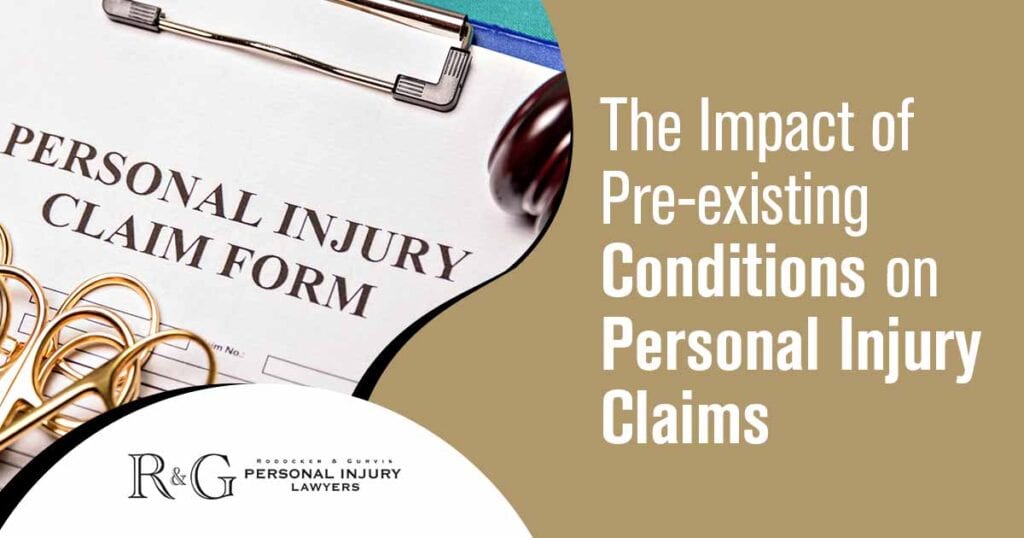Suppose you have a pre-existing condition and are injured in an accident. In that personal injury case, it may be difficult to collect damages since insurance companies tend to argue your pain is related to your pre-existing condition. Any medical issue or health problem you might have had before being injured in an accident is a pre-existing condition.
Understanding Pre-existing Conditions
The U.S. Department of Health and Human Services (HHS) definition of a pre-existing condition is universally applied to personal injury claims. A pre-existing condition is any injury or illness—physical or mental—that predates your insurance claim.
A pre-existing condition existed before the current accident occurred and is something that hasn’t completely healed or something that you are receiving ongoing treatment for so you can achieve full recovery. Common pre-existing conditions include arthritis, heart disease, chronic back pain, diabetes, or previous injuries from other accidents.
How Pre-existing Conditions Can Affect Personal Injury Claims
Personal injury claims involving pre-existing conditions can be pretty tricky. Defendants and insurance adjustors will argue and attempt to prove that your injuries are fabricated, exaggerated, or already exist; however, a skilled personal injury attorney can gather compelling evidence to show that your pre-existing condition or injury changed after the accident.
You may be entitled to compensation if the accident worsened your pre-existing condition. The compensation you can receive for a personal injury claim if you have a pre-existing condition is the same as any other. You could receive compensation for medical bills, equipment, chiropractor visits, prescription medication, lost wages, and pain and suffering.
Pain and suffering are tough to put a dollar amount on. Still, it can be exceptionally challenging to calculate when dealing with a pre-existing condition that has been “made worse” by a recent accident. Determining if the accident is responsible for the damage or aggravated pre-existing conditions can be challenging.
Insurance adjusters might try to reduce your compensation or deny your claim by arguing that your pre-existing condition contributed to your new injuries rather than the accident. Still, medical expert witnesses can help establish causation in personal injury cases with pre-existing conditions. An experienced personal injury lawyer will help secure medical expert witnesses, gather evidence, and build a compelling case that will prove the accident was the primary cause of your injuries.
Legal Considerations
Regarding pre-existing conditions and personal injury cases, the law recognizes that pre-existing conditions can make someone more susceptible to injuries. The “eggshell skull rule” or “thin skull rule” is a common law doctrine that applies to personal injury cases with pre-existing conditions. According to the eggshell skull rule, if someone has a pre-existing condition that makes them more vulnerable to injury than the average person, their pre-existing condition cannot be used against them in court. This means the party responsible for your accident can’t argue they aren’t responsible for the full extent of your injuries because you were predisposed to injury.
While the eggshell skull rule can result in higher compensation for your injuries in a personal injury claim, comparative negligence laws can do the opposite and reduce your financial compensation. Comparative negligence means each party in an accident is deemed at least partially at fault based on their contributions to the occurrence or severity of the accident.
Strategies for Addressing Pre-existing Conditions
To ensure proper treatment and a fair settlement, you must explain your pre-existing condition and the status of your pre-existing condition before and after the accident to your doctor and your personal injury attorney. While pre-existing conditions offer few advantages when it comes to personal injury cases, the detailed medical records someone with a pre-existing condition typically has can be an essential piece of evidence when showing how your condition has changed since the accident.
Medical record documentation can be highly beneficial to a personal injury lawyer because they can discuss this documentation with doctors and other medical witnesses during a court trial. Additionally, your doctors can be expert witnesses for your personal injury claim, and even if your injuries are related to your pre-existing condition, a doctor can testify the suffering you are experiencing is a direct result of your accident.
Mitigating Factors
In some personal injury cases, you may be required to show that you took reasonable steps to mitigate the impact of your pre-existing condition on your injury. Reasonable steps can include attending physical therapy appointments, taking medication as your healthcare provider has directed, and following prescribed treatment plans. Failing to take reasonable steps can weaken your claim and reduce financial compensation.
You must maintain detailed medical treatment records, appointments, and communications with healthcare professionals. This shows you are actively working to address your pre-existing condition.
Experienced Personal Injury Lawyers Can Help with Your Case
Working with experienced personal injury attorneys who understand the complexities of handling cases involving pre-existing conditions can help you receive fair compensation in your personal injury case. Having a pre-existing condition can complicate matters, but with the proper legal representation.
To help determine fault, your personal injury attorney will gather information, review evidence, and use their legal expertise to help determine what kind of compensation might be fair in your personal injury case. A pre-existing condition should not deter you from pursuing a personal injury claim if you’ve been injured due to someone else’s negligence. While it can complicate matters, with the proper legal representation and evidence, you can still seek compensation for your injuries.
Call R&G Personal Injury Attorneys today to discuss your pre-existing conditions and your personal injury claim. For a free consultation, reach us in Columbus, Ohio, at 614-221-3750 or in Cary, North Carolina, at 919-561-6800.





